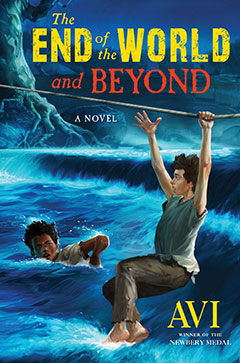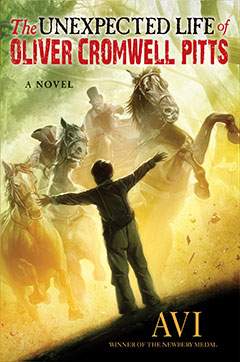 As you may know, there is no more frequently asked question of writers than, “Where do you get your ideas?”
As you may know, there is no more frequently asked question of writers than, “Where do you get your ideas?”
There are some of my books for which I can be specific. Thus, I can tell you place, time, circumstance, for the creation of The Fighting Ground. I can do as much for Poppy.
For my two-volume story—The Unexpected Life of Oliver Cromwell Pitts—and the soon-to-be-published sequel, The End of the World and Beyond—the origins are much more convoluted.
As a matter of personal pleasure and interest I read American and British history. Consider; from 1497, when John Cabot, the Venetian navigator and explorer, touched the coast of Newfoundland and claimed North America for England (and King Henry VII) our two national histories were intertwined.
In 18th Century England, as today, crime—or what was/is defined as crime—was rampant as masses of poor people grew poorer, and the relatively few wealthy folks, grew richer. Part of the pushback was on the other side. Thus, Johnathan Wilde became a master criminal.
In response, the British government created “The Bloody Codes,” draconian legal measures to deal with criminals. Hanging in London, or transportation to the colonies for enforced labor, was part of the response.
 In the early days of our written history the number of transported felons was claimed to be few. “Five thousand,” said Thomas Jefferson. More recent historians have proved otherwise. Indeed, something more than fifty thousand were shipped to the Americas. Among those sent over were children, (boys and girls) who were treated as common criminals when they broke the law. They too were transported. Large numbers were sent to the Caribbean Islands. Even more were sent to Maryland and Virginia, which came to be known as “The Tobacco Coast,” tobacco being the first successful economic staple of the southern colonies.
In the early days of our written history the number of transported felons was claimed to be few. “Five thousand,” said Thomas Jefferson. More recent historians have proved otherwise. Indeed, something more than fifty thousand were shipped to the Americas. Among those sent over were children, (boys and girls) who were treated as common criminals when they broke the law. They too were transported. Large numbers were sent to the Caribbean Islands. Even more were sent to Maryland and Virginia, which came to be known as “The Tobacco Coast,” tobacco being the first successful economic staple of the southern colonies.
The plight of transported felons, as I learned, was also deeply entwined with Afro-American slavery, and all the cruelties involved, and the way so many slaves sought to free themselves in remarkable ways.
I have also long been a reader, with pleasure, of Eighteenth Century British literature, Defoe, Fielding, Sterne, and Smollett.
Put all these elements together, and it’s almost easy to see how the lives, voices, and plots of The Unexpected Life of Oliver Cromwell Pitts—and The End of the World and Beyond—came into my head. There is something from all of the above in these books.
That said, I came to the creation of the story backward. My initial goal was to write about young transported felons. That led to my asking who might be such English persons? How did they become caught up by the English law? In what condition would they have been transported? And, of course, what would be their fate in America? Did any of them regain their freedom?
The history of white slaves in America—which is what the transported English, Irish, and Scotch felons truly were—is not usually a given part of American history. It should be. It’s awful. It’s also quite extraordinary.
While The Unexpected Life of Oliver Cromwell Pitts—and the newly published continuation, The End of the World and Beyond—will give you an inkling of generally unknown history, my goal has been, as always, to write page-turning adventures. Let me assure you, Oliver Cromwell Pitts is a different kind of American hero.
1 thought on “The End of the World and Beyond”
White French Canadians were also transported to the US as slaves. Dreadful! And another part of American history that could definitely use a once-over in the classroom setting is the Thanksgiving story. That said, Canadians aren’t exactly up-front about the details of our history and celebrations either!!